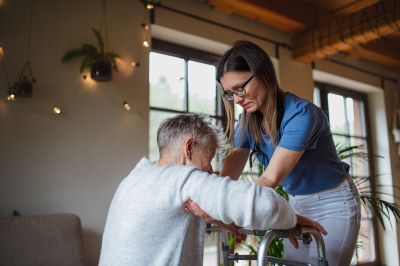To understand the need for Alzheimer’s Caregiver support, you must first understand who they are, their role, and their risk for caregiver burnout. This article will help you understand why there is such a severe need for Alzheimer’s caregivers’ support systems.
Who are the Alzheimer’s Caregivers?
There are approximately 6.5 million people in the U.S. with Alzheimer’s Dementia. An estimated 60% of these people live with a caregiver in the home. 30% of these caregivers are spouses. 50% are grown children caring for a parent or parent-in-law. 25% care for their parents and have children in the home, and 66% of all caregivers are women.
An Alzheimers Caregiver can be in the role for several years. Studies have shown that people over 65 who develop Alzheimer’s disease live an average of 4-8 years after diagnosis. But some may live 20 years after getting diagnosed. In addition, 57% of home caregivers have taken care of their loved ones for more than 4 years.

What is an Alzheimer’s caregiver?
An Alzheimer’s caregiver is simply someone who provides care for a person struggling with the disease. It may include finances, healthcare, medication management, home care, meals, and physical or emotional care.
The first type of Alzheimer’s Caregiver is a family member or friend who lives outside the home and helps them manage their affairs from a distance. This often includes running errands, meal planning, and helping with finances.
The second type of Alzheimer’s Caregiver is the long-distance caregiver. This is a challenging position to be in. Many grown children live in a different state than their parents. They may not see the whole picture with the changes but recognize something is wrong and need to be more involved. They often help manage the finances and arrange for help in the home.
The third type of Alzheimer’s caregiver is a live-in spouse, family member, or friend. This person manages the home and everything that goes with it. They also help their loved ones with primary care.
The fourth type of Alzheimer’s Caregiver is the paid caregiver. These are usually homemakers or nursing assistants who come in to provide the personal care needed. There are several types of paid caregivers; more information about help at home can be found HERE.
What is the role of the Alzheimer’s caregiver?
The caregiver’s role is primarily emotional support and companionship during the Early Stage. However, you will need to help a little more in some areas. For example, helping remember appointments, managing the home’s finances, and planning for the future. Many people can stay in this stage for several years.
Your role really begins to change in the Middle Stage. At this stage, your loved ones enter into what I like to call the in-between phase. This is when their reasoning ability fades away, and they can no longer stay alone. Instead, they need more cues to complete their daily activities, such as bathing, eating, dressing, and toileting. They are in between independence and total care.
During the Late Stage, the Alzheimer’s caregiver is hands-on 24 hours a day with everything. This means they must be fed, bathed, changed diapers, and turned and repositioned every couple of hours to prevent bed sores.
How does dementia affect Alzheimer’s Caregivers?
Caring for another person can sometimes be overwhelming regardless of the caregiver type. The continuous needs, responsibilities, and stress are draining and can lead to physical and emotional health issues.
You don’t get to clock out after 8 hours and go home. It’s like you went to work one day, clocked in, and they said, ” OK, now you need to stay here for the next 10 years, and we aren’t going to worry about any breaks for you”. I think very few would accept that challenge, but you have.
So it’s up to you to figure out a way to get those breaks! You have to take care of YOU! Failure to do so will lead to caregiver burnout and/or physical ailments.
Your emotional health is at risk if you are an Alzheimer’s caregiver. The stressors accompanying this role tend to eat away at you. Depression, anxiety, and caregiver burnout are often a result of these stressors.
Many people don’t realize that physical health is often affected by the caregiver role’s stressors. Exhaustion and lack of sleep are common complaints from caregivers. Both of these actually cause bodily harm. Lack of sleep is linked to several unfavorable health consequences, including heart disease, type 2 diabetes, and depression.
What is caregiver burnout?
Caregiver burnout is a state of physical, emotional, and mental exhaustion. It is often accompanied by a change in attitude. For example, family and friends may notice a difference between someone who is a positive and caring person to a hostile and unconcerned individual.
Burnout can occur when caregivers don’t get the help they need or if they try to do more than they are able, physically or financially.
Learn how to recognize caregiver burnout.
- Loss of interest in activities
- Withdrawing from friends & family
- Neglecting your own needs
- Ignoring the person you are caring for
- Increased frustration toward the person you are caring for
- Change in appetite
- Change in sleep patterns
- Feeling hopeless
- Irritability
- Anxiety
- Depression
- Excessive use of alcohol
- Losing control physically or emotionally
- Feeling caregiving has taken over your life
How to prevent Caregiver Burnout
- Take time out for yourself
- Ask friends and family for help
- Have someone you trust come sit with your loved one for a few hours every week and get out of the house for awhile
- Keep in contact with friends
- Continue to do activities you enjoy
- Don’t keep your feelings bundled up inside
- Have someone you can talk to
- Find a support group- it helps to talk to someone who has been an Alzheimer’s caregiver
- Listen to happy music
- Find some time each day for yourself, get up half an hour early
- Start a journal; many people have found this to be very helpful
What to do if you have Caregiver Burnout?
The first step is learning about Alzheimer’s Caregiver burnout and recognizing the symptoms. Next, you need some help in the home and time away from your caregiver role. If you have family, let them know how heavy your load is. Other options are available if they can’t help or you don’t have a family. Finding those resources to help you is next. Most states, counties, and towns have resources for caregivers in the home.

Alzheimer’s Caregiver Support
What is a support group? A support group is a group of people with shared interests or concerns who come together to talk about their problems and share their experiences and encouragement.
Why do you need a Alzheimer’s Caregiver support group?
A support group is like a second family, only this family is going through a situation very similar to yours. The caregivers in these groups have the same kind of bad days you do. They will understand when you need to vent and support you through your frustrations. Your support group friends will also be there to share the good days with you.
Being an Alzheimer’s caregiver can be very isolating. Caregivers give up so much as the disease progresses, but that doesn’t mean you have to go through it alone.

So, where do you find these Alzheimer’s Caregiver support groups?
They are all over the place! You just have to look a little bit. It used to be they only met in church basements, but now there are hundreds at your fingertips with the internet!
The nice thing about online groups is you can sit back and observe as long as you want. No one requires you to jump in and start talking. Instead, you can see the posts and all the different problems they are having; maybe some of them will relate to what’s going on with your life.
Then one day, if you need to share that you had a great day with someone, they are there to help you celebrate your win. And if you had a horrible day, they will also share that with you.
There are numerous Alzheimers and Facebook groups, and I belong to a few. This week, I created a new Alzheimers on your home Facebook group page. Please feel free to come to join us. Here is the Link.

Hi, I'm Larea, I am a Registered Nurse specializing in Dementia Care, with 30 years of experience supporting dementia patients and their families. Over the years, I have provided care in diverse settings, including homes, hospitals, nursing homes, assisted living facilities, and hospice. My passion is guiding caregivers, sharing my knowledge and experience to help them navigate the challenges of dementia care with confidence and compassion.









0 Comments